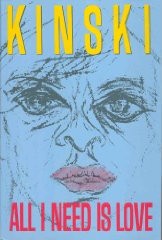All I Need Is Love
 First edition cover artwork by Klaus Kinski | |
| Author | Klaus Kinski |
|---|---|
| Translator | Klaus Kinski[1] |
| Cover artist | Klaus Kinski |
| Subject | Autobiography |
| Publisher | Random House |
Publication date | November 28, 1988 |
| Media type | Print (hardback) |
| Pages | 265 pp (first edition) |
| ISBN | 0-394-54916-3 |
| OCLC | 18379547 |
All I Need Is Love: A Memoir is the autobiography of the German actor Klaus Kinski first published in 1988. It was withdrawn from publication then, after the author's death, retranslated, retitled, and republished in 1996 as Kinski Uncut: The Autobiography of Klaus Kinski.
Reception
When the 1988 edition was published, Klaus Kinski's daughter, Nastassja Kinski, sued her father for libel but the lawsuit was quickly withdrawn.[2] The 1988 edition was withdrawn from publication because of a copyright dispute between Random House and a West German publisher,[3] and because Marlene Dietrich threatened to sue for libel.[4][5] The book was republished in 1996 after Dietrich had died, and the second edition is more cautious naming names.[6]
In the book Herzog on Herzog, Werner Herzog describes the book as "highly fictitious", and that Kinski did not grow up in abject poverty.[7] Herzog also relates how he and Kinski together sought new insults to describe Herzog for the book.[8]
Chapters
The book is written entirely in the present tense, and rarely gives temporal references. It is divided into five chapters:
Chapter One describes his early life up to his discovery of sex and his outrageous desire for it. Chapter Two deals with his short career in the military, his first theatre experiences and successes, his entrance into an insane asylum. The third chapter deals with his comeback. Chapter Five deals with his marriage.
Editions
| Author | Klaus Kinski |
|---|---|
| Translator | Joachim Neugröschel[9] |
| Subject | Autobiography |
| Publisher | Viking Press |
Publication date | August 1, 1996 |
| Media type | Print (hardback) |
| Pages | 336 pp (second edition) |
| ISBN | 0-670-86744-6 |
| OCLC | 34322866 |
The manuscript was written in German. It was translated by the author and was published as a book in English in 1988. It was retranslated by Joachim Neugröschel and reissued in 1996 with a new title. Each edition has material omitted from the other.[10]
- Kinski, Klaus (November 28, 1988). All I Need Is Love: A Memoir. Translated by Klaus Kinski. Cover artwork by Klaus Kinski (1st ed.). New York: Random House. pp. 265. ISBN 0-394-54916-3. OCLC 18379547.
- Kinski, Klaus (August 1, 1996) [First published 1988]. Kinski Uncut: The Autobiography of Klaus Kinski. Translated by Joachim Neugröschel (2nd ed.). New York: Viking. pp. 336. ISBN 0-670-86744-6. OCLC 34322866.
See also
Notes
- ^ Ross 1997. "In this obscure pantheon, a place must be reserved for Klaus Kinski ... who tried to publish the English version of his autobiography in 1988 under the massively ironic title All I Need is Love."
- ^ Wise, James E. Jr.; Baron, Scott (2002). International Stars at War. Annapolis, MD: Naval Institute Press. p. 107. ISBN 1-55750-965-4.
His 1989 autobiography Ich Brauche Liebe (Everything I Need Is Love) infuriated many, including his daughter, actress Nastassia Kinski, who filed a libel suit against him. It was soon withdrawn.
- ^ Ross 1997. "The book was caught in a copyright dispute between Random House and a West German publisher ...."
- ^ "Marlene Dietrich Biography". Monsters & Critics. Archived from the original on 2012-10-14. Retrieved 2011-08-02.
Also, Klaus Kinski wrote a book ... where he claimed that Marlene was a lesbian. It was removed from circulation after threats of a libel lawsuit were made. It was re-released after Marlene's death ...
- ^ "Klaus Kinski". Monsters movies. 2007. Retrieved 2011-08-02.
A libel suit from Marlene Dietrich due to Kinski depicting her as a lesbian resulted in the book being withdrawn from circulation until her death
- ^ Ross 1997. "[T]he new 'uncut' edition is actually much more cautious naming names."
- ^ Herzog 2002, pp. 288–289. "It is a highly fictitious book ... He describes his childhood as one of such poverty that he had to fight with the rats over the last piece of bread. In reality he grew up in a relatively well-to-do middle-class pharmacist's household."
- ^ Herzog 2002, pp. 288–289. "I kind of had a hand in helping him to invent particularly vile expletives. ... I came with a dictionary and we tried to find even fouler expressions."
- ^ Ross 1997. "So why is Kinski such a glum book? Part of the problem may be the translation. Joachim Neugröschel is a respected and experienced translator, but he tries too hard to turn Kinski's thuggish prose into slinky American slang."
- ^ Ross 1997. "Also, there are strange discontinuities between the two versions: each has material omitted from the other ...."
References
- Herzog, Werner; Cronin, Paul (2002). Cronin, Paul (ed.). Herzog on Herzog. Directors on Directing. London: Faber & Faber. p. 288. ISBN 0-571-20708-1. OCLC 50581849. Retrieved 2011-08-04.
- Ross, Alex (January 24, 1997). "Auto-da-fé: Klaus Kinski's self-immolating screed". Slate. Retrieved 2011-08-04.
